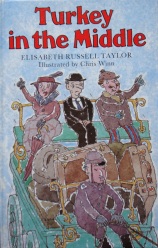 TURKEY IN THE MIDDLE (1983)
TURKEY IN THE MIDDLE (1983)
Joyless Bisley Munt, town clerk, ‘unfamiliar with the beauties of nature and of man’ and unable to respond to either, is invited to the Carters’ for Christmas. For the first time in his life he plays children’s games and becomes convinced he is a turkey, a situation from which he is eventually coaxed by the same kindness which had provided him with ‘the nicest Christmas he had ever known’.
‘Quite loopy … Bisley Munt is a lonely clerk whose only recreation is eating sandwiches at the railway station, until he discovers unexpected happiness. ERT’s story is irresistible’ WOMAN AND HOME
‘An acid, satiric undertone … witty style’ BIRMINGHAM POST
THE LOADSTONE (1978)
A goatherd bequeaths his son Seer a stone. Grateful to his father’s imagination and love, Seer invests the stone with infinite possibilities. He travels the world unharmed and able to reward the lives of others.
‘The story of a quest … a poetic story with a strong flavour of the old sagas about it’ BRITISH BOOK NEWS
 TALES FROM BARLEYMILL (1978)
TALES FROM BARLEYMILL (1978)
A traveller drawn to an ancient village is told four tales: of Tulipina whose life is transformed by an unearthly plant healer; about a simple country boy so in harmony with the forms of nature that he can influence them to perform miracles; about a blind man with a vision of a wrecked ship able to save the crew; and a gentle satire about a man who lives by the rules and tries to get the villagers to do likewise.
‘Good material for storytelling … the style has all the lilt and interest of the spoken word’ John Hirst, BIRMINGHAM POST
‘Delicate, descriptive details and sparkling narrative touches make rewarding reading without detracting from the folklore of dialogue and dialect. One is reminded of Andersen’ JUNIOR BOOKSHELF
 THE GIFTS OF THE TARNS (1977)
THE GIFTS OF THE TARNS (1977)
A tale of two lakes, the waters of Tarn Leban fruitful and good, those of Tarn Tegrof poison to memory. The knife-grinder avoids Tarn Tegrof, but his son drinks from the lake and instantly forgets the past, and learns how to live in the present.
‘Rich in allegorical hints, the incantatory, almost Biblical style lends solemnity without portentousness to a strange, imaginative book’ Brigid Hardwick, THE TIMES
‘A memorable folktale, but the author has also made it a mystifying allegory. For folklore enthusiasts, this is well-told and welcome material’ CHILDREN’S BOOK NEWSLETTER (selected as a best fiction title)

